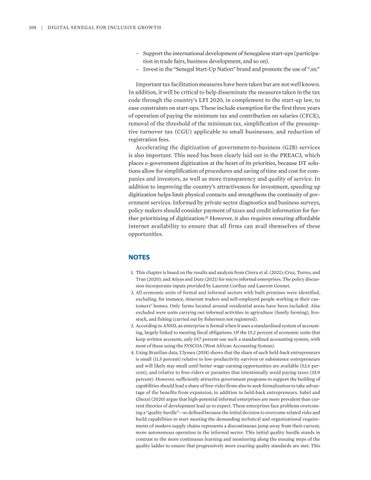108
| Digital Senegal for Inclusive Growth
–– Support the international development of Senegalese start-ups (participation in trade fairs, business development, and so on). –– Invest in the “Senegal Start-Up Nation” brand and promote the use of “.sn.” Important tax facilitation measures have been taken but are not well known. In addition, it will be critical to help disseminate the measures taken in the tax code through the country’s LFI 2020, in complement to the start-up law, to ease constraints on start-ups. These include exemption for the first three years of operation of paying the minimum tax and contribution on salaries (CFCE), removal of the threshold of the minimum tax, simplification of the presumptive turnover tax (CGU) applicable to small businesses, and reduction of registration fees. Accelerating the digitization of government-to-business (G2B) services is also important. This need has been clearly laid out in the PREAC3, which places e-government digitization at the heart of its priorities, because DT solutions allow for simplification of procedures and saving of time and cost for companies and investors, as well as more transparency and quality of service. In addition to improving the country’s attractiveness for investment, speeding up digitization helps limit physical contacts and strengthens the continuity of government services. Informed by private sector diagnostics and business surveys, policy makers should consider payment of taxes and credit information for further prioritizing of digitization.51 However, it also requires ensuring affordable internet availability to ensure that all firms can avail themselves of these opportunities.
NOTES 1. This chapter is based on the results and analysis from Cirera et al. (2021); Cruz, Torres, and Tran (2020); and Atiyas and Dutz (2021) for micro i nformal enterprises. The policy discussion incorporates inputs provided by Laurent Corthay and Laurent Gonnet. 2. All economic units of formal and informal sectors with built premises were identified, excluding, for instance, itinerant traders and self-employed people working at their customers’ homes. Only farms located around residential areas have been included. Also excluded were units carrying out informal activities in agriculture (family farming), livestock, and fishing (carried out by fishermen not registered). 3. According to ANSD, an enterprise is formal when it uses a standardized system of accounting, largely linked to meeting fiscal obligations. Of the 15.2 percent of economic units that keep written accounts, only 19.7 percent use such a standardized accounting system, with most of these using the SYSCOA (West African Accounting System). 4. Using Brazilian data, Ulyssea (2018) shows that the share of such held-back entrepreneurs is small (11.5 percent) relative to low-productivity survivor or subsistence entrepreneurs and will likely stay small until better wage-earning opportunities are available (52.6 percent), and relative to free-riders or parasites that intentionally avoid paying taxes (35.9 percent). However, sufficiently attractive government programs to support the building of capabilities should lead a share of free-rider firms also to seek formalization to take advantage of the benefits from expansion, in addition to held-back entrepreneurs. Sabel and Ghezzi (2020) argue that high-potential informal enterprises are more prevalent than current theories of development lead us to expect. These enterprises face problems overcoming a “quality hurdle”—so defined because the initial decision to overcome related risks and build capabilities to start meeting the demanding technical and organizational requirements of modern supply chains represents a discontinuous jump away from their current, more autonomous operation in the informal sector. This initial quality hurdle stands in contrast to the more continuous learning and monitoring along the ensuing steps of the quality ladder to ensure that progressively more exacting quality standards are met. This



